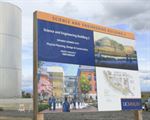
With evidence mounting that the San Joaquin Valley economy is finally gaining strength, the University of California, Merced, today announced that it continues to do its part, investing more than $165 million in the regional economy over the last 14 months.
Total investment in the region now tops $815 million since campus operations began in July 2000, the university said. Statewide, the total is approximately $1.54 billion.
“Recent economic reports from various local sources indicate that job growth and key business indicators in the Valley are finally moving in a positive direction, after years of decline,” UC Merced Chancellor Dorothy Leland said. “While there’s much more room for improvement, we are extremely pleased to be a contributing factor in this much-needed development.”
Through August of this year, the university has made more than $531 million in payroll distributions, purchased $145 million in local goods and services and awarded $140 million in construction contracts to Valley businesses, campus statistics show.
As these investments circulate through the economy — supplemented by a rapidly growing volume of expenditures made by students, parents, visitors and others — the economic “ripple effect” routinely increases their overall financial impact by a factor of two to three times, according to an analysis prepared by the UC Office of the President in 2011.
“UC Merced has given the city of Merced a big economic boost,” said Frank Quintero, director of Economic Development for the city of Merced. “It has provided hundreds of jobs for our residents, and the faculty and staff are customers of our shops, stores and restaurants. The university itself has a ‘buy local’ emphasis that has benefited everyone in Merced from construction crews to catering companies.”
Recent reports show the local economy is gradually picking up. July marked the sixth consecutive month of positive growth in the Valley’s key business indicators, according to the San Joaquin Valley Business Conditions Index, and a midyear report issued by California State University, Stanislaus, showed job growth to be slow but steady in 2011 and the first half of 2012.
Earlier this year, the Milken Institute, which ranks U.S. metropolitan areas each year by how well they create and sustain job growth, said Merced recorded the largest gain of any metro area in the country – up 105 places to 63rd on the list of 379 cities surveyed.
“A major factor in the decision to establish the newest UC campus in the San Joaquin Valley was its likely impact on a region struggling to overcome decades of high unemployment, poverty and economic stagnation,” said Leland. “UC Merced’s development is beginning to have the kind of sustained, beneficial effects we hoped for and expect to accelerate in the years ahead as we continue toward our long-term growth objectives.”
 UC Merced began its eighth academic year this August with a total enrollment of 5,760 students and more than 150 ladder-rank faculty members, both record highs. That compares with 875 students and 60 faculty members in its inaugural year of 2005. Enrollment is projected to reach 10,000 students within the next eight to 10 years and eventually top out at 25,000 students at full build-out.
UC Merced began its eighth academic year this August with a total enrollment of 5,760 students and more than 150 ladder-rank faculty members, both record highs. That compares with 875 students and 60 faculty members in its inaugural year of 2005. Enrollment is projected to reach 10,000 students within the next eight to 10 years and eventually top out at 25,000 students at full build-out.
Within the Valley, businesses based in Fresno and Merced counties have benefited the most from local purchases while those in Fresno, San Joaquin and Stanislaus counties have garnered the largest share of construction contracts.
The university also reported that research expenditures, many of which help support the local economy, amounted to a record $15.8 million in the 2011-12 fiscal year ended June 30 and now total more than $90 million since July 2000. Research grants received by UC Merced faculty members totaled $22 million during the fiscal year.
Research funds are typically awarded by public and private funding sources, many of them outside California, through competitive grant requests. A 26 percent increase in graduate-student enrollment this year is expected to strengthen UC Merced’s research programs significantly.
“As we prepare for the community celebration of Founders Day later this month, we couldn’t be more pleased with our progress to date and the reception we’ve received throughout the region,” Leland said. “We are as committed as ever to bringing research, education and service excellence to the region, state and world in the best University of California tradition.”






